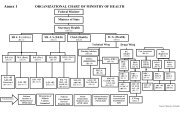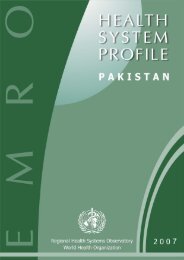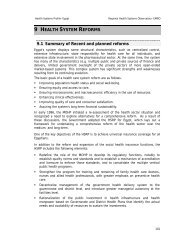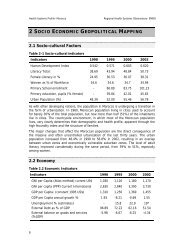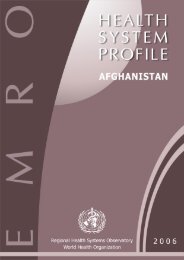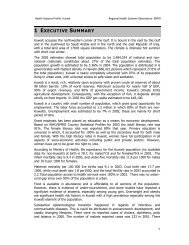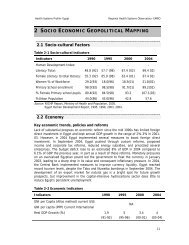The role of contractual arrangements in improving health sector ...
The role of contractual arrangements in improving health sector ...
The role of contractual arrangements in improving health sector ...
Create successful ePaper yourself
Turn your PDF publications into a flip-book with our unique Google optimized e-Paper software.
INTRODUCTION<br />
Lebanon<br />
Contractual <strong>arrangements</strong> play an important <strong>role</strong> <strong>in</strong> the <strong>health</strong> <strong>sector</strong> <strong>in</strong> Lebanon. This owes<br />
to two ma<strong>in</strong> historical developments <strong>in</strong> post-<strong>in</strong>dependence Lebanon: the organization <strong>of</strong><br />
Lebanon’s economy and social structure along a liberal model; and the pr<strong>of</strong>ound consequences<br />
<strong>of</strong> the civil war (1975–1991). S<strong>in</strong>ce its <strong>in</strong>dependence <strong>in</strong> 1943, Lebanese society has been<br />
organized along a liberal model, emphasiz<strong>in</strong>g relatively open markets and encouragement <strong>of</strong><br />
private <strong>in</strong>itiative, lead<strong>in</strong>g to gradual growth <strong>of</strong> the nongovernmental <strong>health</strong> <strong>sector</strong>.<br />
Concomitantly, dur<strong>in</strong>g the relatively prosperous years prior to the civil war, i.e. the 1950s–1960s,<br />
the state took steps towards ensur<strong>in</strong>g and protect<strong>in</strong>g citizens’ <strong>in</strong>terests <strong>in</strong> the <strong>health</strong> area, such as<br />
the establishment <strong>of</strong> the National Social Security Fund (NSSF) <strong>in</strong> 1961 and develop<strong>in</strong>g<br />
legislation to provide free <strong>health</strong> care for the <strong>in</strong>digent.<br />
<strong>The</strong> outbreak <strong>of</strong> civil war <strong>in</strong> 1975 put an end to ambitious plans for public <strong>health</strong><br />
protection, for example through expand<strong>in</strong>g the coverage <strong>of</strong> the NSSF to <strong>in</strong>clude the entire<br />
Lebanese population as well as establishment <strong>of</strong> a strong public <strong>health</strong> system. Dur<strong>in</strong>g the civil<br />
war years, the <strong>role</strong> <strong>of</strong> the government was severely limited. This affected both the provision <strong>of</strong><br />
<strong>health</strong> services, with pr<strong>of</strong>ound deterioration <strong>of</strong> governmental <strong>health</strong> facilities, as well as<br />
regulation <strong>of</strong> the <strong>health</strong> <strong>sector</strong>, <strong>in</strong>clud<strong>in</strong>g the stewardship <strong>role</strong> <strong>of</strong> the M<strong>in</strong>istry <strong>of</strong> Public Health.<br />
<strong>The</strong> nongovernmental <strong>sector</strong> grew tremendously to fill the gap. For example, nongovernmental<br />
oragnizations played an important <strong>role</strong> <strong>in</strong> provid<strong>in</strong>g essential services <strong>in</strong> different areas <strong>in</strong><br />
Lebanon, across the l<strong>in</strong>es <strong>of</strong> divide. With the dismantl<strong>in</strong>g <strong>of</strong> the economy and worsen<strong>in</strong>g <strong>of</strong><br />
social conditions, the government played an <strong>in</strong>creas<strong>in</strong>gly important <strong>role</strong> as a f<strong>in</strong>ancer <strong>of</strong> <strong>health</strong><br />
services for un<strong>in</strong>sured Lebanese.<br />
In the post-civil war years s<strong>in</strong>ce 1991, the growth <strong>of</strong> the private <strong>sector</strong> cont<strong>in</strong>ued while the<br />
re-construction efforts <strong>of</strong> the successive governments took precedence over rebuild<strong>in</strong>g the <strong>health</strong><br />
care <strong>sector</strong>. <strong>The</strong> nongovernmental <strong>health</strong> <strong>sector</strong> (e.g. private practitioners, hospitals,<br />
nongovernmental organizations) became the dom<strong>in</strong>ant providers <strong>of</strong> <strong>in</strong>creas<strong>in</strong>gly complex, more<br />
expensive and high-tech specialist-based <strong>health</strong> care services, while governmental and public<br />
agencies (e.g. NSSF) became <strong>in</strong>creas<strong>in</strong>gly the f<strong>in</strong>ancers <strong>of</strong> these services. Health care costs skyrocketed<br />
(Lebanon spends 12%–13% <strong>of</strong> its GDP on <strong>health</strong>, second only to the US), but this was<br />
not associated with commensurate improvements <strong>in</strong> <strong>health</strong> outcomes. This led <strong>in</strong> the mid 1990s<br />
to <strong>in</strong>creas<strong>in</strong>g calls for <strong>health</strong> <strong>sector</strong> reforms and culm<strong>in</strong>ated with the formation <strong>of</strong> an <strong>in</strong>term<strong>in</strong>isterial<br />
reform committee to design large-scale reforms, aided by a US$ 37 million loan from<br />
the World Bank. Due to multiple factors, large-scale reform efforts have not proved successful.<br />
While discussions on the scope <strong>of</strong> reform cont<strong>in</strong>ue today, there is <strong>in</strong>creas<strong>in</strong>g recognition <strong>of</strong><br />
the importance <strong>of</strong> smaller scale reforms. For example, the M<strong>in</strong>istry <strong>of</strong> Public Heatlh has tried to<br />
assume a more visible and more effective regulatory <strong>role</strong>, which corresponds to its important<br />
<strong>role</strong>s as a f<strong>in</strong>ancer <strong>of</strong> <strong>health</strong> care services for a large segment <strong>of</strong> the Lebanese population and as a<br />
steward <strong>of</strong> the <strong>health</strong> system. Other f<strong>in</strong>anc<strong>in</strong>g agencies also <strong>in</strong>creas<strong>in</strong>gly see the need to use tools<br />
148





